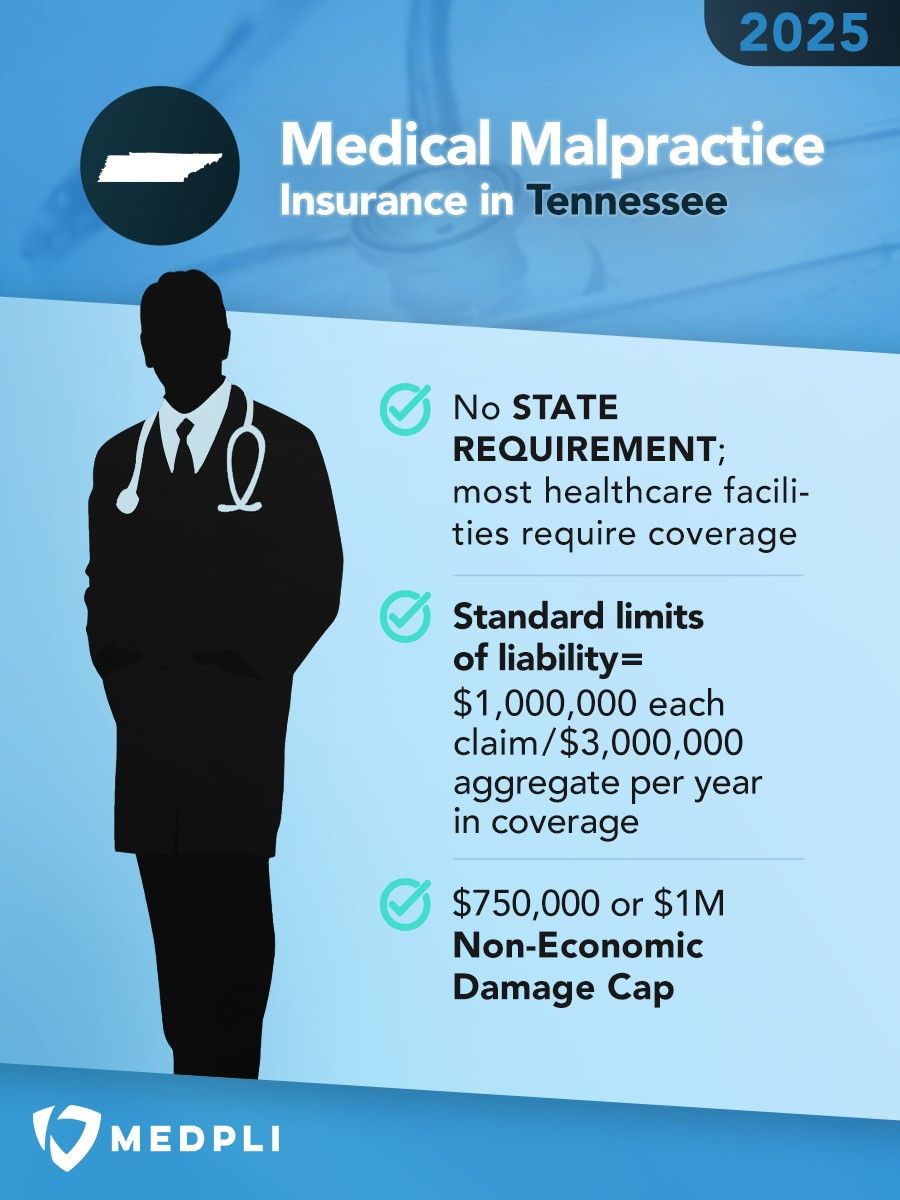Top 5 Malpractice Insurance Carriers in Tennessee
We recommend carriers with an AM Best “A” or higher rating. An A-rating indicates financial strength, long-term solvency, and a history of protecting Tennessee physicians.

2025 Tennessee Malpractice Insurance Rates by Specialty
These rate estimates are for informational purposes only and are based on the TN standard limits of $1,000,000 for Each Claim / $3,000,000 Aggregate per year in coverage.
Quotes require a completed application and underwriter approval. Contact us for a custom estimate if you don’t see your specialty.
| Specialty | 2025 Annual Premium |
2025 Tail Premium |
|---|---|---|
| Anesthesiology | $21,000 | $42,000 |
| Cardiovascular Disease– Minor Surgery | $19,000 | $38,000 |
| Dermatology– No Surgery | $8,000 | $16,000 |
| Emergency Medicine | $32,000 | $64,000 |
| Family Practice– No Surgery | $11,000 | $22,000 |
| Gastroenterology– No Surgery | $15,000 | $30,000 |
| General Practice– No Surgery | $11,000 | $22,000 |
| General Surgery | $48,000 | $96,000 |
| Internal Medicine– No Surgery | $11,000 | $22,000 |
| Neurology– No Surgery | $12,000 | $24,000 |
| Obstetrics and Gynecology– Major Surgery | $71,000 | $142,000 |
| Occupational Medicine | $8,000 | $16,000 |
| Ophthalmology– No Surgery | $9,000 | $18,000 |
| Orthopedic Surgery– No Spine | $44,000 | $88,000 |
| Pathology– No Surgery | $8,000 | $16,000 |
| Pediatrics– No Surgery | $11,000 | $22,000 |
| Pulmonary Disease– No Surgery | $18,000 | $36,000 |
| Psychiatry | $8,000 | $16,000 |
| Radiology – Diagnostic | $23,000 | $46,000 |
Tennessee Medical Malpractice Payouts From 2015-2023
How Natural Disasters Impact Tennessee’s Insurance Costs
When tornadoes, flooding or other severe storms hit Tennessee, the damage isn’t just physical, or local—the financial repercussions impact insurance costs nationwide. To offset the growing risk of weather-related losses, insurers must increase premiums to maintain financial stability.
Why Are Insurance Rates Rising?
How Medical Malpractice Insurance Is Affected
Reinsurance providers now demand higher premiums and stricter payout thresholds from primary insurance providers. In consequence, insurers increase policyholder premiums across all sectors, including medical malpractice coverage for doctors and surgeons in Tennessee.
Types of Professional Liability Insurance for Tennessee Physicians
Types of Professional Liability Insurance for Tennessee Physicians
Physicians in Tennessee can choose between these two primary types of medical malpractice insurance:

- Provides coverage for incidents that occurred during the policy period IF the claim is filed while the policy is still active. If a claim is filed after the policy ends, that claim is NOT covered.
- Typically, it offers lower premiums at the start of the policy, but rates increase yearly as the policy matures.
- Physicians must obtain tail insurance coverage when a claims-made policy ends to ensure protection against future claims related to incidents that occurred during the policy period. Tail insurance premiums require a one-time cash payment equal to approximately 200% of the claims-made policy’s annual premium.

- Provides coverage for incidents that occurred during the policy period, regardless of when a claim is reported to the carrier.
- Typically, it offers more costly premiums at the start of the policy, but the rate stays constant throughout the policy’s duration.
- Physicians do not need tail coverage when an occurrence policy ends.
In 2023, Tennessee physicians were held liable for 94 medical malpractice payouts.
- Average Payout: $367,077
- Total Payout: $34,505,250
(Source: National Practitioner Data Bank)
Does Tennessee Have Damage Caps for Medical Malpractice Lawsuits?
As part of the Tennessee Civil Justice Act of 2011, noneconomic damages shall not exceed $750,000. However, this cap increases to $1,000,000 for catastrophic injuries or loss, which can include:
- Full or partial paralysis from a spinal cord injury
- Amputation of both hands, both feet, or one of each
- Third degree burns on 40% or more of the body, or the face
- Wrongful death of a parent with a surviving, dependent minor child/children
Non-economic damage caps do not apply in the event of:
- Intentional harm
- Fraud, destruction or concealment of evidence
- Intoxication or impairment from alcohol/drugs
- Felony conviction in connection to the injury
According to Tennessee Code § 29-39-104, punitive damages may be awarded if the defendant acted “maliciously, intentionally, fraudulently or recklessly.” Still, the amount shall not exceed $500,000 or 2x the total compensatory damages.
There is no limit on economic damages in the state of Tennessee.
Tennessee Statute of Limitations for Medical Malpractice Claims
In Tennessee, health care liability actions must be filed within 1 year of the alleged harm or date of discovery, but no more than 3 years after the harmful act.
Exceptions include:
- Fraudulent concealment
- Foreign object(s) left in the plaintiff’s body
- Mental incapacity
- For minors, the 1-year statute of limitations does not begin until their 18th birthday.
Why Tennessee Doctors Partner with MEDPLI
We exclusively broker medical malpractice insurance, focusing daily on making the professional liability process less burdensome and expensive for doctors.
With MEDPLI, Tennessee physicians:
MEDPLI helps doctors in every specialty.
Whether you’re an OB/GYN in Nashville or a MedSpa Owner in Chattanooga, MEDPLI will find you premier coverage at a competitive rate.
Call 800-969-1339 or Request a Quote.





